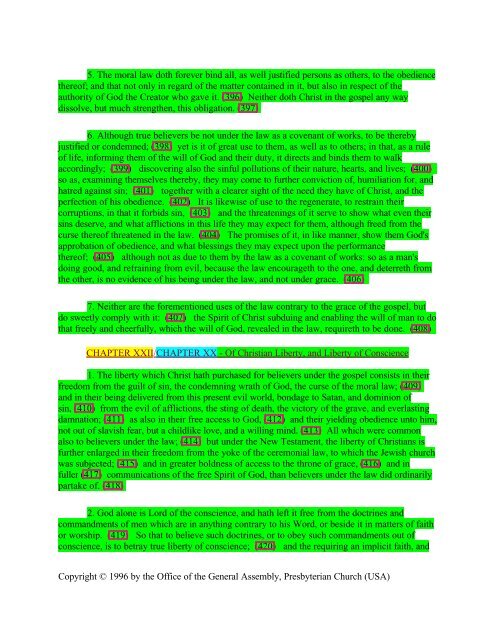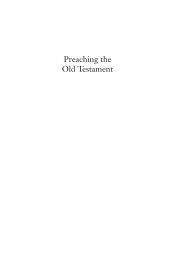The Book of Confessions - The Presbyterian Leader
The Book of Confessions - The Presbyterian Leader
The Book of Confessions - The Presbyterian Leader
Create successful ePaper yourself
Turn your PDF publications into a flip-book with our unique Google optimized e-Paper software.
5. <strong>The</strong> moral law doth forever bind all, as well justified persons as others, to the obedience<br />
there<strong>of</strong>; and that not only in regard <strong>of</strong> the matter contained in it, but also in respect <strong>of</strong> the<br />
authority <strong>of</strong> God the Creator who gave it. (396) Neither doth Christ in the gospel any way<br />
dissolve, but much strengthen, this obligation. (397)<br />
6. Although true believers be not under the law as a covenant <strong>of</strong> works, to be thereby<br />
justified or condemned; (398) yet is it <strong>of</strong> great use to them, as well as to others; in that, as a rule<br />
<strong>of</strong> life, informing them <strong>of</strong> the will <strong>of</strong> God and their duty, it directs and binds them to walk<br />
accordingly; (399) discovering also the sinful pollutions <strong>of</strong> their nature, hearts, and lives; (400)<br />
so as, examining themselves thereby, they may come to further conviction <strong>of</strong>, humiliation for, and<br />
hatred against sin; (401) together with a clearer sight <strong>of</strong> the need they have <strong>of</strong> Christ, and the<br />
perfection <strong>of</strong> his obedience. (402) It is likewise <strong>of</strong> use to the regenerate, to restrain their<br />
corruptions, in that it forbids sin, (403) and the threatenings <strong>of</strong> it serve to show what even their<br />
sins deserve, and what afflictions in this life they may expect for them, although freed from the<br />
curse there<strong>of</strong> threatened in the law. (404) <strong>The</strong> promises <strong>of</strong> it, in like manner, show them God's<br />
approbation <strong>of</strong> obedience, and what blessings they may expect upon the performance<br />
there<strong>of</strong>; (405) although not as due to them by the law as a covenant <strong>of</strong> works: so as a man's<br />
doing good, and refraining from evil, because the law encourageth to the one, and deterreth from<br />
the other, is no evidence <strong>of</strong> his being under the law, and not under grace. (406)<br />
7. Neither are the forementioned uses <strong>of</strong> the law contrary to the grace <strong>of</strong> the gospel, but<br />
do sweetly comply with it: (407) the Spirit <strong>of</strong> Christ subduing and enabling the will <strong>of</strong> man to do<br />
that freely and cheerfully, which the will <strong>of</strong> God, revealed in the law, requireth to be done. (408)<br />
CHAPTER XXII/CHAPTER XX - Of Christian Liberty, and Liberty <strong>of</strong> Conscience<br />
1. <strong>The</strong> liberty which Christ hath purchased for believers under the gospel consists in their<br />
freedom from the guilt <strong>of</strong> sin, the condemning wrath <strong>of</strong> God, the curse <strong>of</strong> the moral law; (409)<br />
and in their being delivered from this present evil world, bondage to Satan, and dominion <strong>of</strong><br />
sin, (410) from the evil <strong>of</strong> afflictions, the sting <strong>of</strong> death, the victory <strong>of</strong> the grave, and everlasting<br />
damnation; (411) as also in their free access to God, (412) and their yielding obedience unto him,<br />
not out <strong>of</strong> slavish fear, but a childlike love, and a willing mind. (413) All which were common<br />
also to believers under the law; (414) but under the New Testament, the liberty <strong>of</strong> Christians is<br />
further enlarged in their freedom from the yoke <strong>of</strong> the ceremonial law, to which the Jewish church<br />
was subjected; (415) and in greater boldness <strong>of</strong> access to the throne <strong>of</strong> grace, (416) and in<br />
fuller (417) communications <strong>of</strong> the free Spirit <strong>of</strong> God, than believers under the law did ordinarily<br />
partake <strong>of</strong>. (418)<br />
2. God alone is Lord <strong>of</strong> the conscience, and hath left it free from the doctrines and<br />
commandments <strong>of</strong> men which are in anything contrary to his Word, or beside it in matters <strong>of</strong> faith<br />
or worship. (419) So that to believe such doctrines, or to obey such commandments out <strong>of</strong><br />
conscience, is to betray true liberty <strong>of</strong> conscience; (420) and the requiring an implicit faith, and<br />
Copyright © 1996 by the Office <strong>of</strong> the General Assembly, <strong>Presbyterian</strong> Church (USA)




